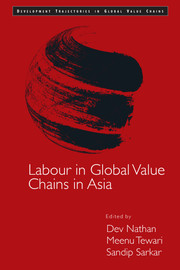Book contents
- Frontmatter
- Contents
- Figures
- Tables
- Foreword
- Preface
- Acknowledgements
- Introduction
- Captive Governance
- 2 Achieving Better Work for Apparel Workers in Asia
- 3 Improving Wages and Working Conditions in the Bangladesh Garment Sector: The Role of Horizontal and Vertical Relations
- 4 Bargaining in Garment GVCs: The Asia Floor Wage
- 5 Fresh Produce Markets, Standards, and Dynamics of Labour: Grapes in India
- 6 The ‘Zero-Fee’ Tour: Price Competition and Chain Downgrading in Chinese Tourism
- 7 Restricting Competition to Reduce Poverty: Impact of the Tourism Value Chain in an Upland Economy in China
- 8 Restructuring of Post-crisis GVCs: Tourism in Bali, Indonesia
- 9 Dynamics of Labour-intensive Clusters in China: Wage Costs and Moving Inland
- 10 Migrant Labour in Global Value Chains in Asia
- Modular Governance
- Relational Governance
- Conclusions
- Notes on Contributors
- Index
6 - The ‘Zero-Fee’ Tour: Price Competition and Chain Downgrading in Chinese Tourism
from Captive Governance
Published online by Cambridge University Press: 23 July 2017
- Frontmatter
- Contents
- Figures
- Tables
- Foreword
- Preface
- Acknowledgements
- Introduction
- Captive Governance
- 2 Achieving Better Work for Apparel Workers in Asia
- 3 Improving Wages and Working Conditions in the Bangladesh Garment Sector: The Role of Horizontal and Vertical Relations
- 4 Bargaining in Garment GVCs: The Asia Floor Wage
- 5 Fresh Produce Markets, Standards, and Dynamics of Labour: Grapes in India
- 6 The ‘Zero-Fee’ Tour: Price Competition and Chain Downgrading in Chinese Tourism
- 7 Restricting Competition to Reduce Poverty: Impact of the Tourism Value Chain in an Upland Economy in China
- 8 Restructuring of Post-crisis GVCs: Tourism in Bali, Indonesia
- 9 Dynamics of Labour-intensive Clusters in China: Wage Costs and Moving Inland
- 10 Migrant Labour in Global Value Chains in Asia
- Modular Governance
- Relational Governance
- Conclusions
- Notes on Contributors
- Index
Summary
Introduction
Global production network (GPN) analysis is based on the link between product and factor market outcomes. Nathan and Sarkar (2011) and Milberg and Winkler (2013) argued that rents are usually concentrated in one part of the chain, that of the lead firm, while the manufacturers or suppliers received merely competitive or normal profits. Competitive profits result in employees or service providers of supplier firms receiving merely competitive wages, while employees in lead firms could hope to share part of their firms’ rents. The result of rents to lead firms and competitive profits to suppliers depends on a particular market structure, i.e., that of oligopolistic-lead firms and competitive suppliers. Oligopolistic-lead firms could be price makers in both final and intermediate product markets. But what if the lead firms were themselves in a highly competitive market? Kaplinsky (2007) pointed out that in such a situation price competition would transform the rents of lead firms into consumer surpluses.
This effect of highly competitive markets at the level of both service suppliers and lead firms is looked at in this paper in the context of the rise of the ‘zero-fee’ tour in Chinese tourism. An unusual and notable feature of tourism in China has been the rise of the zero-fee tour, or, even more extreme, the buying of tourists, whereby service providers pay the outbound tour operator (OTO) for the tourists provided. Who then pays for the service providers and how is this done? These questions need to be answered if we are to understand this phenomenon. More important, however, is understanding the factors that have led to the rise of this phenomenon, its possible negative or downgrading effects on the tourism services’ network and ways of dealing with it. This paper takes up these questions in the light of the GPN analysis mentioned above.
We start by laying out the basic structure of the tourism services’ production network, along with its associated cash flow system, and then go on to consider how the zero-fee mode changes the usual cash flow system. This is followed by an analysis of both supply- and demand-side factors and the way they work through the production structure. The fieldwork for this study was conducted in Lijiang and Shangri-la in Yunnan province and at the Great Wall at Badaling. These areas were chosen as representing indigenous, or minority, and mainstream or mass tourism, respectively.
- Type
- Chapter
- Information
- Labour in Global Value Chains in Asia , pp. 119 - 138Publisher: Cambridge University PressPrint publication year: 2016



